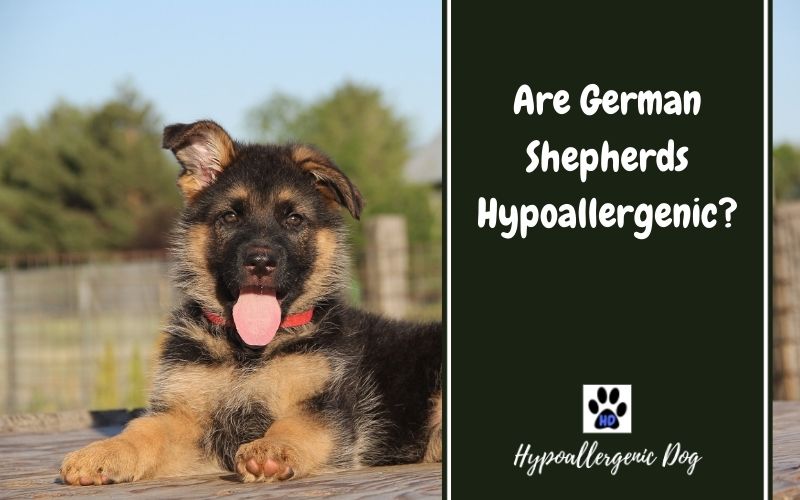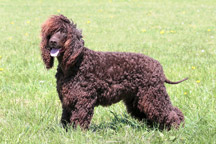Are German Shepherds Hypoallergenic Dogs?
No! Unfortunately, German Shepherds aren’t considered a hypoallergenic dog breed, meaning that they are unsuitable for those who suffer from pet allergies.
The German Shepherd
The German Shepherd, as suggested in the name, is of German origin and falls into the medium to large-sized canine category. It’s quite a modern breed of dog, originating around 1899. German Shepherds are known for shedding, and twice a year they blow their coats. This can lead to weeks of intense shedding, making them an unsuitable pick for those with pet allergies.
This breed is intelligent, obedient, and confident, with a stubborn streak, but also fiercely loyal. Their intelligence and obedience mean they’re easily trained, making an ideal family pet.
Did You Know…
After the First World War, the German Shepherd breed name was changed to “Alsatian.” This was down to people not wanting the association with Germany and their part in the war.
However, in 1977, opinion changed, and the breed reverted from Alsatian to the original name of German Shepherd.
For a synopsis of the details below, skip to our German Shepherd dog breed summary further down the page.
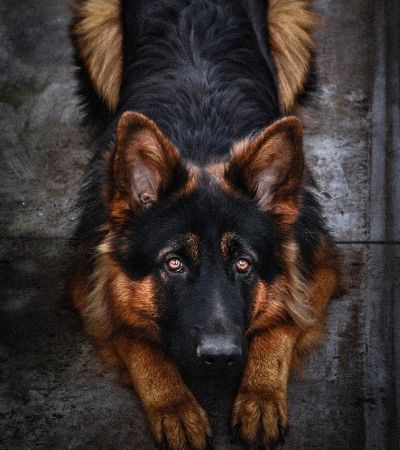
German Shepherd Quick Facts
| Hypoallergenic Dog: | No |
| Shedding: | High |
| Drooling: | Low |
| Size: | Medium – Large |
| Breed Group: | Pastoral (Herding) |
| Lifespan: | 9-13 years |
| Energy Level: | High |
| Trainability: | Easy |
| Family Dog: | Yes! |
What’s Coming up on This Page?
The German Shepherd’s Physical Characteristics
German Shepherd’s Coat
German Shepherd’s Temperament
German Shepherd’s Grooming
Exercise & Training
German Shepherd’s Health Issues and Care
German Shepherd Hypoallergenic Alternatives
Conclusion
If you have specific questions about the German Shepherd dog breed, check out our FAQ section.
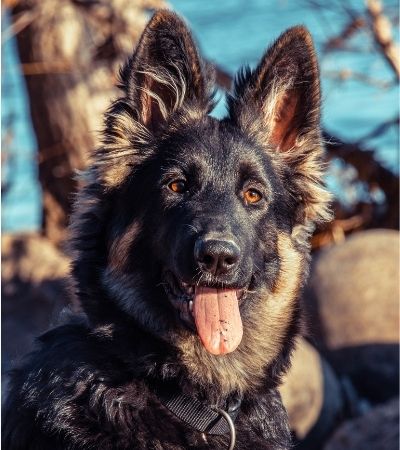
About the Breed
The German Shepherd’s Physical Characteristics
The handsome Golden Retriever varies in size, mainly dependent on sex.
| Size Variety | Height | Weight |
| Male | 24-26 inches (61-66 cm) | 66-88 pounds (30-40 kg) |
| Female | 22-24 inches (56-61 cm) | 49-71 pounds (22-32 kg) |
German Shepherd dogs are extremely intelligent and capable, making them a great choice for a family dog and, of course, a working dog. Its breed trademarks are a square head, pointed ears, and a long muzzle. They also have slightly angled hind legs and a bushy tail.
German Shepherd’s Coat
German Shepherds have a thick double coat, made up of:
- Soft undercoat: this acts as insulation in the colder months
- Long outer coat: the part that you can touch
The double coat is a form of protection in their traditionally cold habitats. German Shepherds are known for shedding and will blow their coats twice a year in anticipation of the changing seasons. When this happens, they shed intensely for several weeks.
What’s more, the long coat is a magnet for dander. If you couple that with the constant shedding, you can understand why the breed is unsuitable for someone with pet allergies.
German Shepherd’s Temperament
German Shepherds are loyal and fearless dogs. They are very affectionate towards their loved ones but are wary of strangers, so they are great guard dogs. If you want your German Shepherd to get on with guests, it’s a good idea to ensure they receive plenty of interaction with children and other dogs from an early age.
German Shepherd dogs shouldn’t be left alone for more than 4 hours, as they can suffer from separation anxiety or distress.
Exercise & Training
Encouraging Good Behavior in Your German Shepherd
German Shepherds are an exceptionally energetic breed of dog. Hence, they must receive the level of exercise necessary to burn off all that energy. This will also ensure you have a well-behaved pet. You should expect to spend 2-3 hours a day focusing on exercise to cater to their physical and mental needs.
One of the most intelligent working dogs, German Shepherds can understand new commands in less than five repetitions, and obey the first command given around 95 percent of the time. They are also people-pleasers, which means many owners are able to train them by themselves.
German Shepherds are a high-energy dog breed, so are best suited to those that lead an active lifestyle to take them out for regular walks or one that has a specific job to give them.
Similar Breeds
German Shepherd Grooming
With such beautifully thick coats, German Shepherds must be regularly groomed. As a double-coated breed, they have double the layers to care for. The undercoat is a thick, plush layer of fur, while the outer layer is rougher to keep them protected from the weather.
German Shepherd coats require plenty of grooming and should be brushed 3-4 times a week. This will keep the fur soft and shiny by eradicating any loose, dead hairs.
However, they shouldn’t be bathed too often, this can cause dry, irritated skin, which could lead to other health issues. It can also strip their double coat of its natural oils, making it dry and rough. For a dog with a healthy coat and skin, a bath may only be necessary every few months.
German Shepherds are super active, and long nails pose a huge risk — so it’s important to care for them properly. Failure to do so could lead to tearing and an unpleasant infection or ingrown nails.
Long nails also change the alignment of the foot, which can lead to issues regarding weight distribution and postural problems, and the chance of splayed toes. Thus, by keeping their nails short the dog will walk better and maintain a healthy posture to aid good exercise levels.
The regularity of nail trimming will vary depending on the type of floors you have and the ground that they walk/run on every day. If they’re used to soft ground, you will find that their nails will grow a lot quicker.
Ears should be checked at least once a week and cleaned when necessary. German Shepherds are less prone to ear problems than other breeds, but it’s still important to check them regularly. You should also avoid getting their ears wet when bathing, the excess moisture within the ear canal can lead to infection.
Find out what equipment you will need for grooming your dog.
German Shepherds Health Issues and Care
This breed is susceptible to certain medical issues, including:
- Hip dysplasia.
- Elbow dysplasia.
- Chronic Degenerative Radiculomyelopathy — this causes weakness to back legs leading to paralysis.
- Anal furunculosis — a painful disease that causes ulceration around a dog’s bottom.
- Inherited eye diseases — including cataracts and multifocal retinal dysplasia.
- Epilepsy.
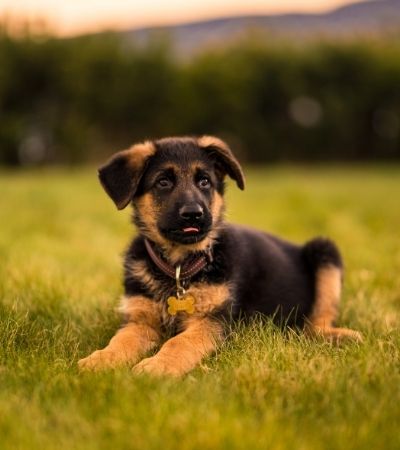
German Shepherd Hypoallergenic Alternatives
German Shepherds are amazing dogs, intelligent, loyal, loving, and trainable. Sadly, due to their thick double coat and excessive shedding, for those with canine-related allergies, this breed isn’t suitable.
If you have your heart set on this type of dog, there may be other compatible tail-wagger companions.
The Shepadoodle is a cross between a German Shepherd and a Standard Poodle. This is one of the most common hypoallergenic German Shepherd mixes and one that will maintain the breed’s large size.
Other German Shepherd hybrids with hypoallergenic traits include the Sheptese — a cross between a German Shepherd and a Maltese. Although, do remember that a mixed breed may not look or have the characteristics of the original breed.
The following breeds may not have all the characteristics of a German Shepherd, but they’re hypoallergenic with some similarities.
A Wirehaired Pointing Griffon. Although they look absolutely nothing like a German Shepherd, they are high energy, love to please their humans, and are amazing around children. They’re also super easy to train, and shedding is minimal.
Another alternative could be the Giant Schnauzer. This breed is super trainable, loves being part of a family, and doesn’t shed. However, they aren’t as energetic as a German Shepherd, but that won’t stop them from wanting to be involved in every part of your life.
Irish Water Spaniel is a friendly, sociable, and perfect family dog. Like a German Shepherd, they’re loyal to their family and also easily trainable. Yet these pooches are a low-shedding breed, so shouldn’t irritate allergies — an amazing hypoallergenic dog choice.
Conclusion
If you do suffer from pet allergies, a German Shepherd isn’t an ideal choice for you due to their double coat and intense shedding. That said, there are several hypoallergenic mixes that may offer you some of the appealing German Shepherd characteristics.
From the likes of the Shepadoodle, the Giant Schnauzer, and the Irish Water Spaniel, any one of these could be the perfect choice if you’re allergic to pet fur or dander.
Make sure you do some thorough research on the breed you are interested in before settling, and that you find a reputable breeder or shelter to find your companion.
So, in conclusion, are German Shepherds hypoallergenic? No, they aren’t. But they are amazing family dogs that show immense loyalty and guardianship.
German Shepherd’s FAQ
Are German Shepherds Bad for Allergies?
German Shepherds are intelligent, intensely loyal, and brave. However, their double coat, thick fur, and intense shedding make them a poor fit for someone who suffers from pet allergies. If you’re still interested in a German Shepherd, consider checking out some of the hypoallergenic German Shepherd mixes, such as the Shepadoodle.
Do Hypoallergenic German Shepherds Exist?
You won’t find a purebred hypoallergenic German Shepherd. One of the characteristics of this particular breed is a thick coat. This coat sheds to the extreme twice per year, and it also constantly loses fur.
How Hypoallergenic Are German Shepherds?
Zero percent. German Shepherds have a thick fur coat that tends to shed all year round. Even short-haired German Shepherds aren’t hypoallergenic. Most dogs that are hypoallergenic have hair rather than fur, which doesn’t cause the same allergic reaction as fur and dander.
Is There A Type Of German Shepherd That Doesn’t Shed?
There is no purebred German Shepherd dog that does not shed. The only way to create this type of dog would be to crossbreed them with a hypoallergenic dog such as a poodle. Even then, you could not guarantee it would have the same hypoallergenic properties as a pure poodle.
What Are the Worst Dogs for Allergies?
These are the worst dogs for those with allergies
- Basset Hound.
- Doberman Pinscher.
- German Shepherd.
- Labrador Retriever.
What Is the Biggest Hypoallergenic Dog?
There are a few large hypoallergenic dog breeds, such as:
- Giant Schnauzer.
- Standard Poodles.
- Afghan Hound.
- Irish Water Spaniel.
- German Shepherd hypoallergenic mix breeds.
German Shepherd’s Facts Summary
| Breed | German Shepherd |
| Hypoallergenic? | No |
| Size | Medium-Large |
| Height | 22 to 26 inches (56 to 66 cm) |
| Weight | 49 to 88 pounds (22 to 40 kg) |
| Lifespan | 9 to 13 years |
| Temperament | Alert, curious, intelligent, loyal, stubborn. |
| Colors | Black, black & tan, sable, black & silver, red & black, grey. |
| Coat | Double-coated |
| How much grooming? | Moderate |
| How much shedding | Excessive shedding |
| Dander levels | High |
| Saliva–Drooling and licking frequency? | Low |
| Energy levels | High |
| How much exercise do they need? | A lot! |
| Health problems | Yes — health and genetic conditions. |
| Suitable for kids? | Yes. |
| How much do they bark? | Regularly, but can be trained. |
| Can they be left alone? | Not for longer than 4 hours. They can suffer from separation anxiety if left alone for long periods. |
| Intelligent? | Yes. |
| Trainable? | Yes. Highly trainable. |
| How popular as a pet? | Very popular in the UK and US. |

